2024年人教版中考二轮复习课件专题8 第4节 情态动词(共30张PPT)
文档属性
| 名称 | 2024年人教版中考二轮复习课件专题8 第4节 情态动词(共30张PPT) |  | |
| 格式 | pptx | ||
| 文件大小 | 180.0KB | ||
| 资源类型 | 教案 | ||
| 版本资源 | 通用版 | ||
| 科目 | 英语 | ||
| 更新时间 | 2024-02-25 11:34:24 | ||
图片预览

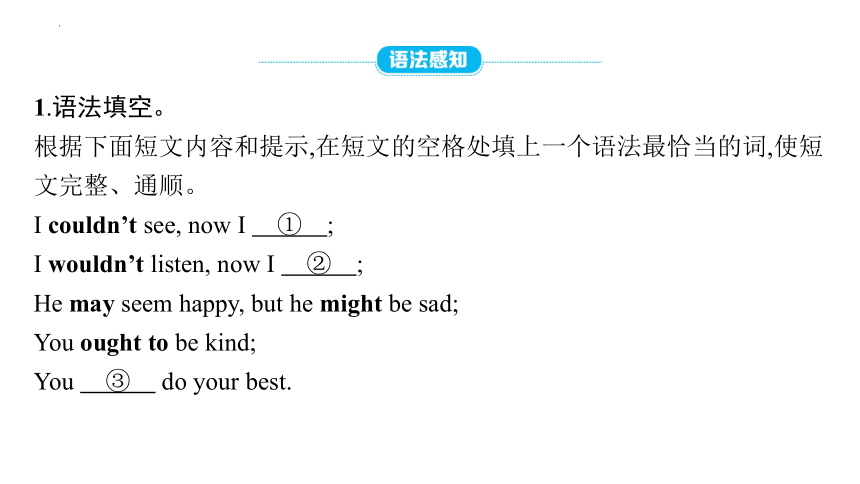
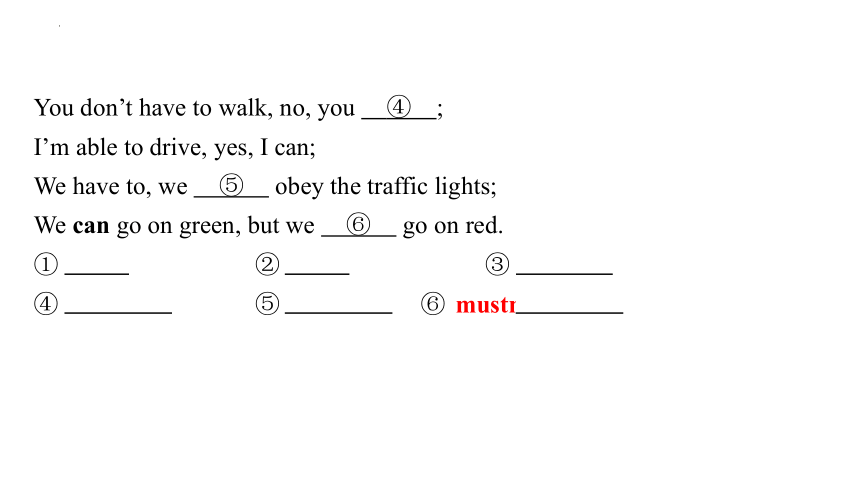
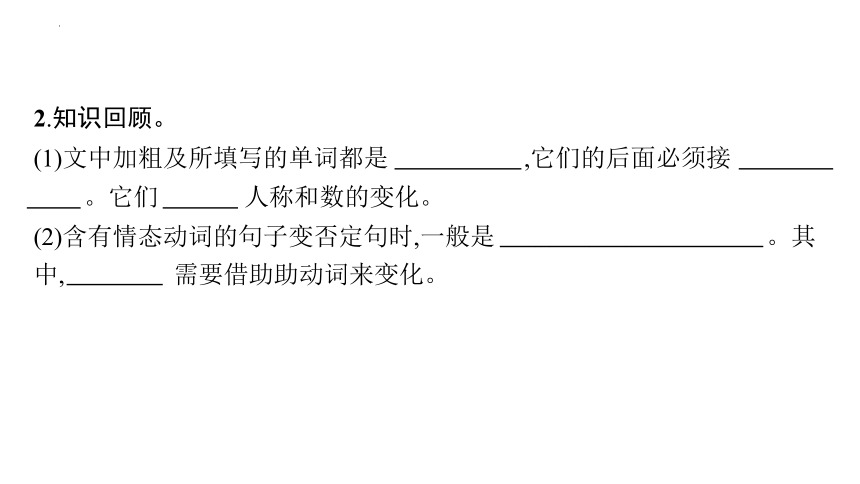
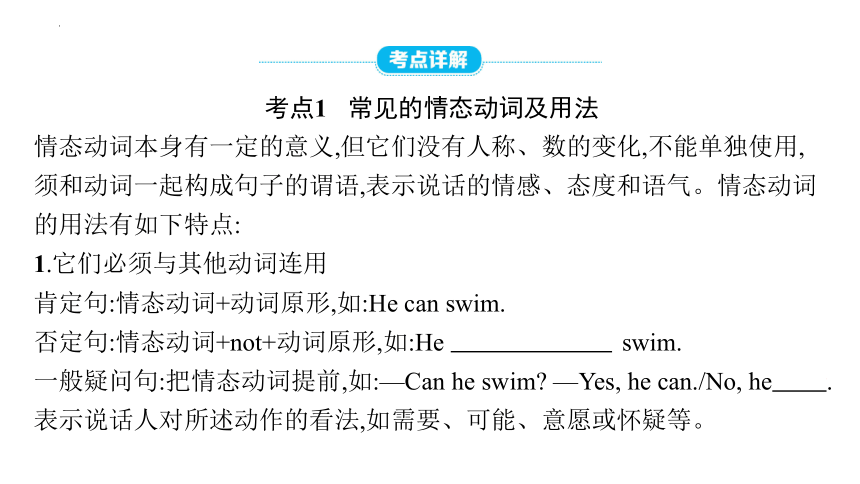
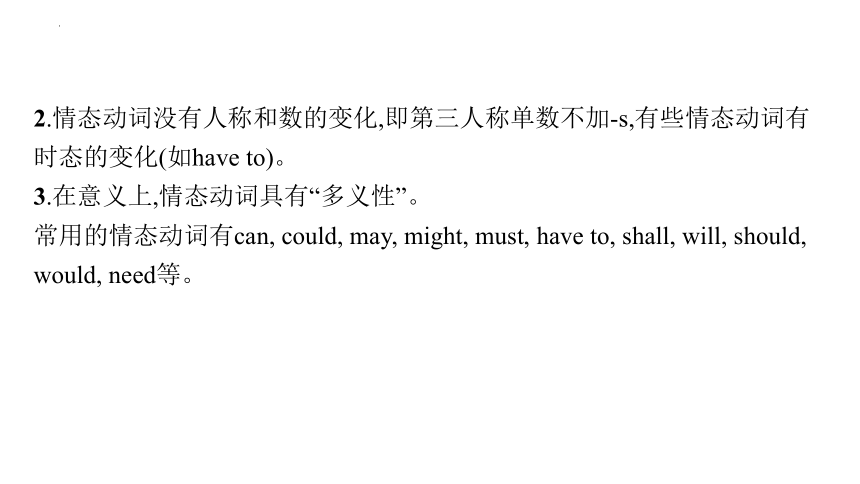
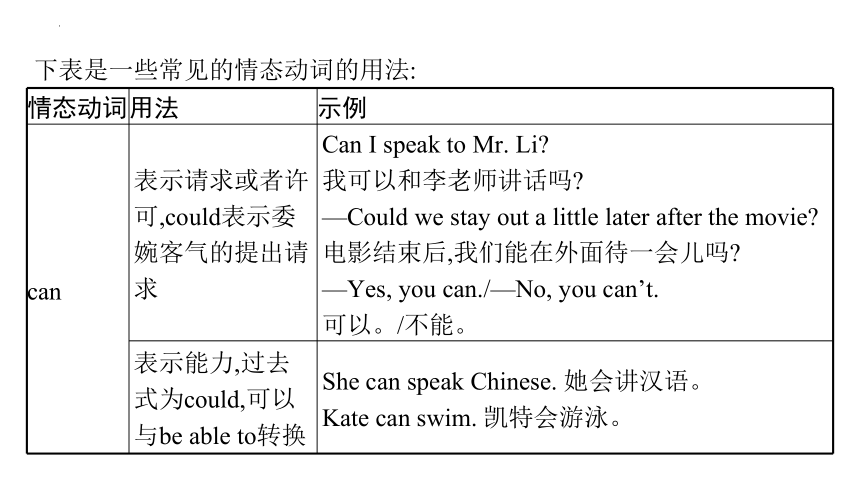
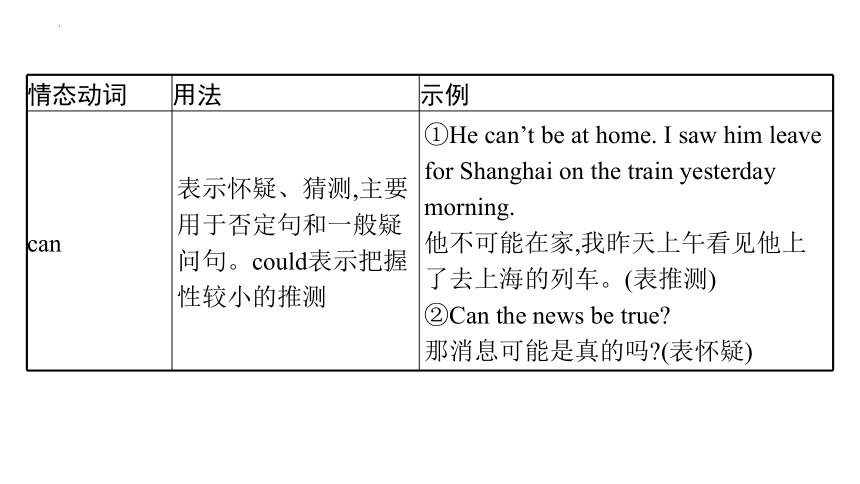
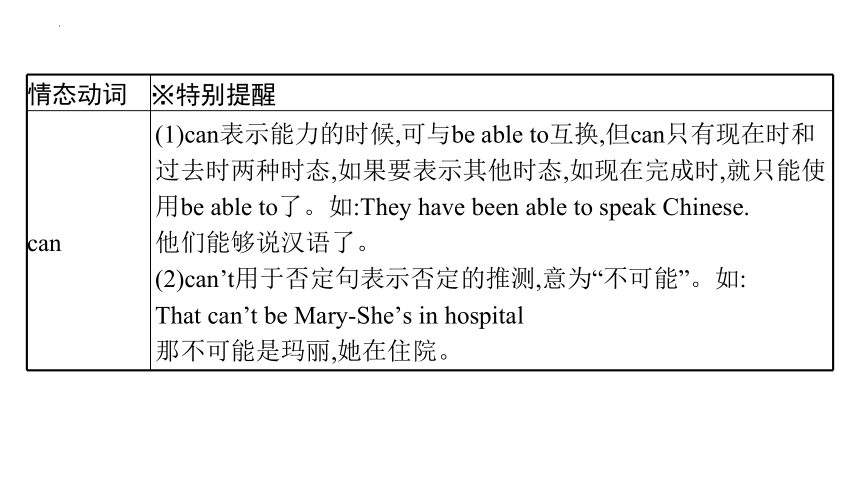
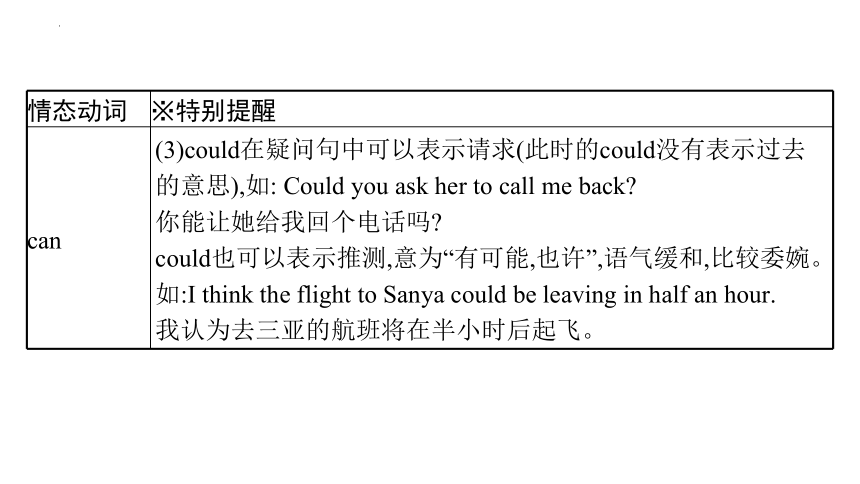
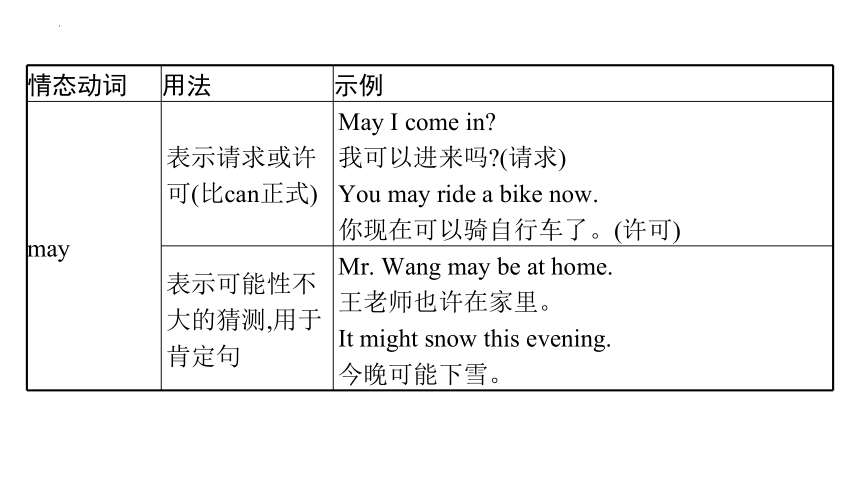
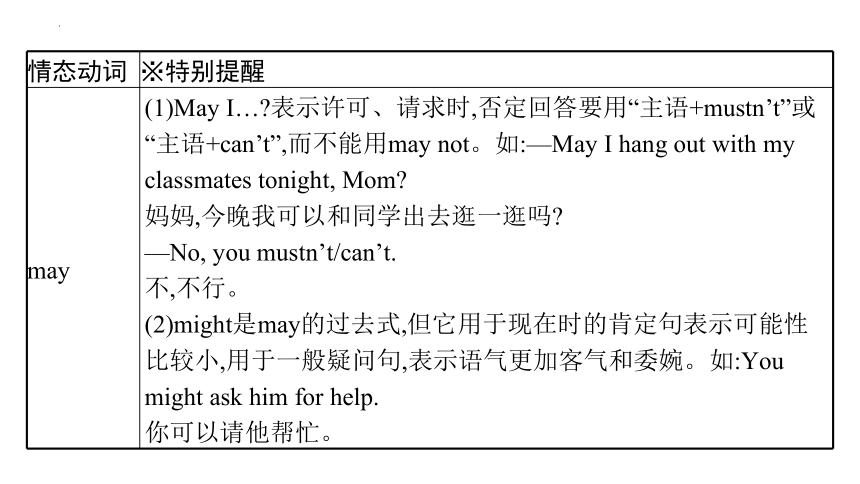
文档简介
(共30张PPT)
第4节 情态动词
1.语法填空。
根据下面短文内容和提示,在短文的空格处填上一个语法最恰当的词,使短文完整、通顺。
I couldn’t see, now I ① ;
I wouldn’t listen, now I ② ;
He may seem happy, but he might be sad;
You ought to be kind;
You ③ do your best.
You don’t have to walk, no, you ④ ;
I’m able to drive, yes, I can;
We have to, we ⑤ obey the traffic lights;
We can go on green, but we ⑥ go on red.
① can ② will ③ should
④ needn’t ⑤ must ⑥ mustn’t
2.知识回顾。
(1)文中加粗及所填写的单词都是 情态动词 ,它们的后面必须接 动词原形 。它们 没有 人称和数的变化。
(2)含有情态动词的句子变否定句时,一般是 在情态动词后面加not 。其中, have to 需要借助助动词来变化。
考点1 常见的情态动词及用法
情态动词本身有一定的意义,但它们没有人称、数的变化,不能单独使用,须和动词一起构成句子的谓语,表示说话的情感、态度和语气。情态动词的用法有如下特点:
1.它们必须与其他动词连用
肯定句:情态动词+动词原形,如:He can swim.
否定句:情态动词+not+动词原形,如:He can’t/cannot swim.
一般疑问句:把情态动词提前,如:—Can he swim —Yes, he can./No, hecan’t.
表示说话人对所述动作的看法,如需要、可能、意愿或怀疑等。
2.情态动词没有人称和数的变化,即第三人称单数不加-s,有些情态动词有时态的变化(如have to)。
3.在意义上,情态动词具有“多义性”。
常用的情态动词有can, could, may, might, must, have to, shall, will, should, would, need等。
下表是一些常见的情态动词的用法:
情态动词 用法 示例
can 表示请求或者许可,could表示委婉客气的提出请求 Can I speak to Mr. Li
我可以和李老师讲话吗
—Could we stay out a little later after the movie
电影结束后,我们能在外面待一会儿吗
—Yes, you can./—No, you can’t.
可以。/不能。
表示能力,过去式为could,可以与be able to转换 She can speak Chinese. 她会讲汉语。
Kate can swim. 凯特会游泳。
情态动词 用法 示例
can 表示怀疑、猜测,主要用于否定句和一般疑问句。could表示把握性较小的推测 ①He can’t be at home. I saw him leave for Shanghai on the train yesterday morning.
他不可能在家,我昨天上午看见他上了去上海的列车。(表推测)
②Can the news be true
那消息可能是真的吗 (表怀疑)
情态动词 ※特别提醒
can (1)can表示能力的时候,可与be able to互换,但can只有现在时和过去时两种时态,如果要表示其他时态,如现在完成时,就只能使用be able to了。如:They have been able to speak Chinese.
他们能够说汉语了。
(2)can’t用于否定句表示否定的推测,意为“不可能”。如:
That can’t be Mary-She’s in hospital
那不可能是玛丽,她在住院。
情态动词 ※特别提醒
can (3)could在疑问句中可以表示请求(此时的could没有表示过去的意思),如: Could you ask her to call me back
你能让她给我回个电话吗
could也可以表示推测,意为“有可能,也许”,语气缓和,比较委婉。
如:I think the flight to Sanya could be leaving in half an hour.
我认为去三亚的航班将在半小时后起飞。
情态动词 用法 示例
may 表示请求或许可(比can正式) May I come in
我可以进来吗 (请求)
You may ride a bike now.
你现在可以骑自行车了。(许可)
表示可能性不大的猜测,用于肯定句 Mr. Wang may be at home.
王老师也许在家里。
It might snow this evening.
今晚可能下雪。
情态动词 ※特别提醒
may (1)May I… 表示许可、请求时,否定回答要用“主语+mustn’t”或“主语+can’t”,而不能用may not。如:—May I hang out with my classmates tonight, Mom
妈妈,今晚我可以和同学出去逛一逛吗
—No, you mustn’t/can’t.
不,不行。
(2)might是may的过去式,但它用于现在时的肯定句表示可能性比较小,用于一般疑问句,表示语气更加客气和委婉。如:You might ask him for help.
你可以请他帮忙。
情态动词 用法 示例 ※特别提醒
must 表示义务、命令或必要(主观看法),其否定形式为mustn’t,表示禁止做某事 You must be careful next time. 下次你一定要小心。 You mustn’t take photos here.你不许在这儿拍照。 You mustn’t play with fire. 你禁止玩火。 must用于一般疑问句,肯定回答用must或have to,但否定回答必须使用needn’t或don’t (doesn’t)have to,而不能使用mustn’t。如:
—Must I hand in my homework today
今天我必须交我的作业吗
—No, you needn’t./No, you don’t have to.
不,没有必要。
情态动词 用法 示例 ※特别提醒
must 表推测,常用must be…或must be+v.-ing形式 Look! The light is on. He must be in the room. 看!灯是亮着的,他准是在屋子里。 She must be working in the field.她一定还在地里干活呢。 must be表示肯定推测,意思是“一定、准是”。
情态动词 用法 示例 ※特别提醒
have to have to侧重于强调客观条件需要做的事情 I have to clean my room first. 我首先得打扫屋子。 It’s raining, and I have to stay at home. 天在下雨,我不得不待在家里。 must强调主观的需要;have to强调客观(外力作用)的需要,也可以意为“不得不”。如:
I must go to school and learn some knowledge.
我必须上学学知识。
I have to go to school because the holiday is over.
假期结束了,我不得不回学校上课了。
情态动词 用法 示例
have to have to有人称和数的变化,其他情态动词没有 Mr Green has to work on the farm all day.
格林先生不得不整天在农场上干活。
Mother is ill. I have to stay
at home and look after her.
母亲生病了,我必须在家照顾她。
We will have to ask Li Lei instead.
我们将不得不请李雷代替了。
She had to work over 12 hours a day at that time.那时,她不得不每天工作12个多小时。
情态动词 用法 示例 ※特别提醒
need 主要用于疑问句和否定句中 You needn’t hand in your homework before Friday. 你没必要周五前交作业。 need还可以作实义动词,意为“需要”。need to do sth.需要做某事
You need to finish your work before 10.
你需要在10点前完成你的工作。
考点2 其他情态动词及用法
1.should的用法
should意为“应该”,可表示劝告、建议、义务、责任等。should not=shouldn’t,其后加动词原形。
(1)用来提供帮助、提出建议,要求对方给出意见。如:
Should I help you with the community affairs
我可以帮你做一些社区事务吗
Should we clean the classroom now
现在我们应该打扫教室吗
(2)表达义务、职责等。如:
I think today’s children should really learn to respect their elders.
我认为今天的孩子应该好好学习尊敬长辈。
You should tell your mother about it at once.
你应该立即把此事告诉你妈妈。
2.will和would的用法
will常用于第二人称,在疑问句中表示询问、请求,否定形式是won’t。 would用来表示客气地请某人做某事,否定形式是wouldn’t。
(1)表示“将、将要、自愿做……”等。如:
People will die without air or water.
人离开水和空气将会死的。
I’ll do my best. 我将会尽力而为。
(2)would like to do=want to do sth.表示“想要做某事”。如:
Would you like to go with me = Do you want to go with me
你想和我一起去吗
拓展:had better表示“最好”,相当于助动词,只有一种形式,后面跟动词原形,否定词形式为had better not。
如:It is pretty cold. You’d better put on your coat.
天很冷,你最好把你的大衣穿上。
He’d(=He had)better do it now.
他最好现在做这件事。
You’d better go now. 你最好现在就走。
She’d better not cry. 她最好别哭。
Ⅰ.单项选择。
( C )1.— I take photos here
—Sorry, you can’t. It’s not allowed in the museum.(2022·北京)
A.Must B.Need
C.Can D.Will
( B )2.The book be Mary’s. We can see her name on it.(2022·天津)
A.need B.must
C.can’t D.needn’t
( C )3.—Do you like poems
—Yes. I read poems when I was 5.(2022·黑龙江哈尔滨)
A.must B.can
C.could D.would
( C )4.We should learn some basic life skills since we depend on ourselves some day.(2022·江苏无锡)
A.can B.can’t
C.must D.mustn’t
( D )5.Protect your hearing. Don’t wait until you hear a thing.
(2022·江苏扬州)
A.needn’t B.mustn’t
C.shouldn’t D.can’t
( D )6.The public sign in the library means people smoke there.
(2022·江苏连云港)
A.could B.must
C.couldn’t D.mustn’t
( B )7.Your answer be right, but I’m going to check to make sure.(2023·四川成都)
A.can’t B.might
C.must D.mustn’t
( D )8.People talk on a phone while they are driving.
A.needn’t B.might
C.must D.mustn’t
( A )9.Finish your homework first, and then you play football for an hour.
A.can B.need
C.must D.may
( C ) 10.You’d better at others when they make mistakes.
A.laugh B.to laugh
C.not laugh D.not to laugh
Ⅱ.用恰当的情态动词填空。
1.—Are you going to the cinema tonight
—I don’t know. I might go or I might stay at home.
2.—Difficulties always go with me!
—Cheer up!If God closes a door in front of you,there must be a window opened for you.
3.—Must I hand in the report now
—No,you needn’t/don’t have to . Tomorrow is OK.
4.There’s enough time for you to go to the airport. You needn’t/don’t have to hurry now.
5.—I have been to the moon twice.
—You must be joking!It’s impossible!
Ⅲ.完成句子。
1.志合者,不以山海为远。
Even mountains and seas can’t distance people with common aspirations(志向).
2.今日事,今日毕。
Don’t put off till tomorrow what should be done today.
3.The students in this school needn’t worry about having no books to read.(同义句)
The students in this school don’t have to worry about having no books to read.
4.Maybe he wants to go to Beijing next year.(同义句)
He may want to go to Beijing next year.
第4节 情态动词
1.语法填空。
根据下面短文内容和提示,在短文的空格处填上一个语法最恰当的词,使短文完整、通顺。
I couldn’t see, now I ① ;
I wouldn’t listen, now I ② ;
He may seem happy, but he might be sad;
You ought to be kind;
You ③ do your best.
You don’t have to walk, no, you ④ ;
I’m able to drive, yes, I can;
We have to, we ⑤ obey the traffic lights;
We can go on green, but we ⑥ go on red.
① can ② will ③ should
④ needn’t ⑤ must ⑥ mustn’t
2.知识回顾。
(1)文中加粗及所填写的单词都是 情态动词 ,它们的后面必须接 动词原形 。它们 没有 人称和数的变化。
(2)含有情态动词的句子变否定句时,一般是 在情态动词后面加not 。其中, have to 需要借助助动词来变化。
考点1 常见的情态动词及用法
情态动词本身有一定的意义,但它们没有人称、数的变化,不能单独使用,须和动词一起构成句子的谓语,表示说话的情感、态度和语气。情态动词的用法有如下特点:
1.它们必须与其他动词连用
肯定句:情态动词+动词原形,如:He can swim.
否定句:情态动词+not+动词原形,如:He can’t/cannot swim.
一般疑问句:把情态动词提前,如:—Can he swim —Yes, he can./No, hecan’t.
表示说话人对所述动作的看法,如需要、可能、意愿或怀疑等。
2.情态动词没有人称和数的变化,即第三人称单数不加-s,有些情态动词有时态的变化(如have to)。
3.在意义上,情态动词具有“多义性”。
常用的情态动词有can, could, may, might, must, have to, shall, will, should, would, need等。
下表是一些常见的情态动词的用法:
情态动词 用法 示例
can 表示请求或者许可,could表示委婉客气的提出请求 Can I speak to Mr. Li
我可以和李老师讲话吗
—Could we stay out a little later after the movie
电影结束后,我们能在外面待一会儿吗
—Yes, you can./—No, you can’t.
可以。/不能。
表示能力,过去式为could,可以与be able to转换 She can speak Chinese. 她会讲汉语。
Kate can swim. 凯特会游泳。
情态动词 用法 示例
can 表示怀疑、猜测,主要用于否定句和一般疑问句。could表示把握性较小的推测 ①He can’t be at home. I saw him leave for Shanghai on the train yesterday morning.
他不可能在家,我昨天上午看见他上了去上海的列车。(表推测)
②Can the news be true
那消息可能是真的吗 (表怀疑)
情态动词 ※特别提醒
can (1)can表示能力的时候,可与be able to互换,但can只有现在时和过去时两种时态,如果要表示其他时态,如现在完成时,就只能使用be able to了。如:They have been able to speak Chinese.
他们能够说汉语了。
(2)can’t用于否定句表示否定的推测,意为“不可能”。如:
That can’t be Mary-She’s in hospital
那不可能是玛丽,她在住院。
情态动词 ※特别提醒
can (3)could在疑问句中可以表示请求(此时的could没有表示过去的意思),如: Could you ask her to call me back
你能让她给我回个电话吗
could也可以表示推测,意为“有可能,也许”,语气缓和,比较委婉。
如:I think the flight to Sanya could be leaving in half an hour.
我认为去三亚的航班将在半小时后起飞。
情态动词 用法 示例
may 表示请求或许可(比can正式) May I come in
我可以进来吗 (请求)
You may ride a bike now.
你现在可以骑自行车了。(许可)
表示可能性不大的猜测,用于肯定句 Mr. Wang may be at home.
王老师也许在家里。
It might snow this evening.
今晚可能下雪。
情态动词 ※特别提醒
may (1)May I… 表示许可、请求时,否定回答要用“主语+mustn’t”或“主语+can’t”,而不能用may not。如:—May I hang out with my classmates tonight, Mom
妈妈,今晚我可以和同学出去逛一逛吗
—No, you mustn’t/can’t.
不,不行。
(2)might是may的过去式,但它用于现在时的肯定句表示可能性比较小,用于一般疑问句,表示语气更加客气和委婉。如:You might ask him for help.
你可以请他帮忙。
情态动词 用法 示例 ※特别提醒
must 表示义务、命令或必要(主观看法),其否定形式为mustn’t,表示禁止做某事 You must be careful next time. 下次你一定要小心。 You mustn’t take photos here.你不许在这儿拍照。 You mustn’t play with fire. 你禁止玩火。 must用于一般疑问句,肯定回答用must或have to,但否定回答必须使用needn’t或don’t (doesn’t)have to,而不能使用mustn’t。如:
—Must I hand in my homework today
今天我必须交我的作业吗
—No, you needn’t./No, you don’t have to.
不,没有必要。
情态动词 用法 示例 ※特别提醒
must 表推测,常用must be…或must be+v.-ing形式 Look! The light is on. He must be in the room. 看!灯是亮着的,他准是在屋子里。 She must be working in the field.她一定还在地里干活呢。 must be表示肯定推测,意思是“一定、准是”。
情态动词 用法 示例 ※特别提醒
have to have to侧重于强调客观条件需要做的事情 I have to clean my room first. 我首先得打扫屋子。 It’s raining, and I have to stay at home. 天在下雨,我不得不待在家里。 must强调主观的需要;have to强调客观(外力作用)的需要,也可以意为“不得不”。如:
I must go to school and learn some knowledge.
我必须上学学知识。
I have to go to school because the holiday is over.
假期结束了,我不得不回学校上课了。
情态动词 用法 示例
have to have to有人称和数的变化,其他情态动词没有 Mr Green has to work on the farm all day.
格林先生不得不整天在农场上干活。
Mother is ill. I have to stay
at home and look after her.
母亲生病了,我必须在家照顾她。
We will have to ask Li Lei instead.
我们将不得不请李雷代替了。
She had to work over 12 hours a day at that time.那时,她不得不每天工作12个多小时。
情态动词 用法 示例 ※特别提醒
need 主要用于疑问句和否定句中 You needn’t hand in your homework before Friday. 你没必要周五前交作业。 need还可以作实义动词,意为“需要”。need to do sth.需要做某事
You need to finish your work before 10.
你需要在10点前完成你的工作。
考点2 其他情态动词及用法
1.should的用法
should意为“应该”,可表示劝告、建议、义务、责任等。should not=shouldn’t,其后加动词原形。
(1)用来提供帮助、提出建议,要求对方给出意见。如:
Should I help you with the community affairs
我可以帮你做一些社区事务吗
Should we clean the classroom now
现在我们应该打扫教室吗
(2)表达义务、职责等。如:
I think today’s children should really learn to respect their elders.
我认为今天的孩子应该好好学习尊敬长辈。
You should tell your mother about it at once.
你应该立即把此事告诉你妈妈。
2.will和would的用法
will常用于第二人称,在疑问句中表示询问、请求,否定形式是won’t。 would用来表示客气地请某人做某事,否定形式是wouldn’t。
(1)表示“将、将要、自愿做……”等。如:
People will die without air or water.
人离开水和空气将会死的。
I’ll do my best. 我将会尽力而为。
(2)would like to do=want to do sth.表示“想要做某事”。如:
Would you like to go with me = Do you want to go with me
你想和我一起去吗
拓展:had better表示“最好”,相当于助动词,只有一种形式,后面跟动词原形,否定词形式为had better not。
如:It is pretty cold. You’d better put on your coat.
天很冷,你最好把你的大衣穿上。
He’d(=He had)better do it now.
他最好现在做这件事。
You’d better go now. 你最好现在就走。
She’d better not cry. 她最好别哭。
Ⅰ.单项选择。
( C )1.— I take photos here
—Sorry, you can’t. It’s not allowed in the museum.(2022·北京)
A.Must B.Need
C.Can D.Will
( B )2.The book be Mary’s. We can see her name on it.(2022·天津)
A.need B.must
C.can’t D.needn’t
( C )3.—Do you like poems
—Yes. I read poems when I was 5.(2022·黑龙江哈尔滨)
A.must B.can
C.could D.would
( C )4.We should learn some basic life skills since we depend on ourselves some day.(2022·江苏无锡)
A.can B.can’t
C.must D.mustn’t
( D )5.Protect your hearing. Don’t wait until you hear a thing.
(2022·江苏扬州)
A.needn’t B.mustn’t
C.shouldn’t D.can’t
( D )6.The public sign in the library means people smoke there.
(2022·江苏连云港)
A.could B.must
C.couldn’t D.mustn’t
( B )7.Your answer be right, but I’m going to check to make sure.(2023·四川成都)
A.can’t B.might
C.must D.mustn’t
( D )8.People talk on a phone while they are driving.
A.needn’t B.might
C.must D.mustn’t
( A )9.Finish your homework first, and then you play football for an hour.
A.can B.need
C.must D.may
( C ) 10.You’d better at others when they make mistakes.
A.laugh B.to laugh
C.not laugh D.not to laugh
Ⅱ.用恰当的情态动词填空。
1.—Are you going to the cinema tonight
—I don’t know. I might go or I might stay at home.
2.—Difficulties always go with me!
—Cheer up!If God closes a door in front of you,there must be a window opened for you.
3.—Must I hand in the report now
—No,you needn’t/don’t have to . Tomorrow is OK.
4.There’s enough time for you to go to the airport. You needn’t/don’t have to hurry now.
5.—I have been to the moon twice.
—You must be joking!It’s impossible!
Ⅲ.完成句子。
1.志合者,不以山海为远。
Even mountains and seas can’t distance people with common aspirations(志向).
2.今日事,今日毕。
Don’t put off till tomorrow what should be done today.
3.The students in this school needn’t worry about having no books to read.(同义句)
The students in this school don’t have to worry about having no books to read.
4.Maybe he wants to go to Beijing next year.(同义句)
He may want to go to Beijing next year.
同课章节目录
- 词法
- 名词
- 动词和动词短语
- 动词语态
- 动词时态
- 助动词和情态动词
- 非谓语动词
- 冠词
- 代词
- 数词和量词
- 形容词副词及其比较等级
- 介词和介词短语
- 连词和感叹词
- 构词法
- 相似、相近词比较
- 句法
- 陈述句
- 一般疑问句和否定疑问句
- 特殊疑问句及选择疑问句
- 反意疑问句
- 存在句(There be句型)
- 宾语从句
- 定语从句
- 状语从句
- 主谓一致问题
- 简单句
- 并列句
- 复合句
- 主谓一致
- 主、表语从句
- 名词性从句
- 直接引语和间接引语
- 虚拟语气
- 感叹句
- 强调句
- 倒装句
- 祈使句
- 句子的成分
- 句子的分类
- 题型专区
- 单项选择部分
- 易错题
- 完形填空
- 阅读理解
- 词汇练习
- 听说训练
- 句型转换
- 补全对话
- 短文改错
- 翻译
- 书面表达
- 任务型阅读
- 语法填空
- 其他资料
